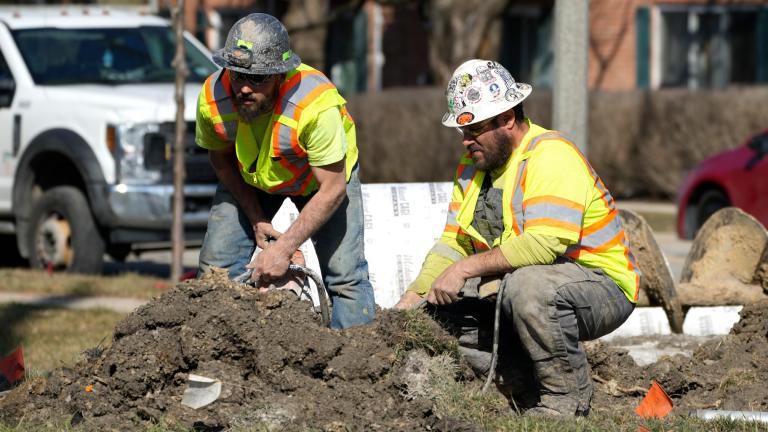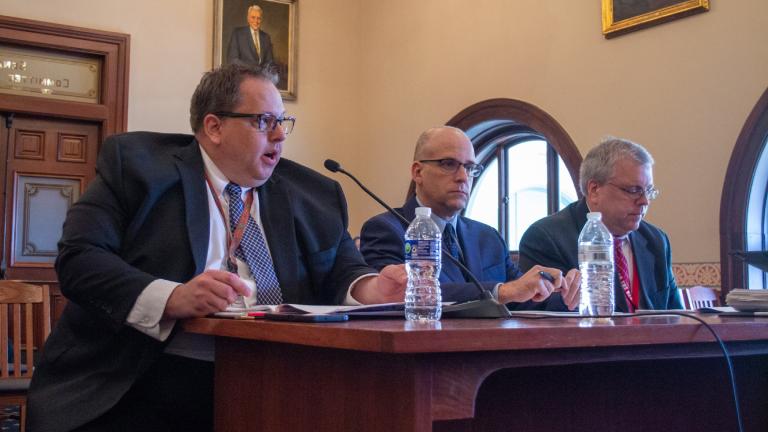It’s not just drivers who are paying attention to high gasoline prices, politicians are too. That increased scrutiny is leading to efforts to bring taxpayers (read: voters) relief.
There’s plenty of opportunity, given that gas is taxed at near every level of government, such that someone who fills their tank at a gas station in Chicago will pay a composite tax of approximately 72 cents a gallon.
- 18.4 cents per gallon at the federal level
- 39.2 cents per gallon at the state level; the state motor fuel tax is dedicated to road and bridge work
- 6 cents per gallon by Cook County, which is deposited in the county’s Public Safety Fund
- 8 cents per gallon by Chicago, which goes into the city’s general revenue fund
Other counties and home rule municipalities may likewise tax gasoline, at limited amounts.
That composite tax does not include the state’s 6.25% sales tax, also levied on gasoline. Unlike per-gallon, consumption-based taxes, consumers pay a higher sales tax when the per-gallon cost of crude increases, as it has in recent months.
President Joe Biden has moved to ease price pressures through opening oil reserves. Some governors, including Wisconsin Gov. Tony Evers, have called on the federal government to temporarily lift its tax on gasoline, though Illinois’ Gov. J.B. Pritzker was not a signatory to a letter making that request.
Cook County Board President Toni Preckwinkle’s press office said “we are actively monitoring the impact of the war in Ukraine on global and local gas prices as well as any federal, state and city action on this issue. Gas tax relief is something Cook County is exploring.”
Chicago is also exploring taking action.
Mayor Lori Lightfoot said a Monday hearing to consider dropping last year’s 3-cent per gallon increase in the city’s gas tax was postponed as the administration considers options.
“The shocking escalation in gasoline prices, I think not only is shocking to see, but shocking to feel and experience, and I’ve been talking to residents all over the city who are really feeling pinched with their inability to get the normal amount of gas that they would because their dollars are just not stretching that far,” Lightfoot said of the delay. “So what we’re looking at is ways in which we can have maximum impact, not only in terms of the pinch that people are feeling but also the maximum number of people who can be affected.”
Meanwhile, Illinois lawmakers are in the final weeks of budget talks that will determine whether the state reduces its tax burden.
Illinois’ motor fuel tax doubled in 2019 from 19 cents to 38 cents a gallon, as part of a package to fund the bipartisan $45 billion Rebuild Illinois capital program. That law, enacted by Gov. Pritzker, tied the tax going forward to the Consumer Price Index (CPI), which ticked up some last July and is expected to go up again this coming summer by about 2 cents, to 41 cents a gallon.
As part of his budget proposal, Pritzker proposed a one-year motor fuel tax freeze, such that the per-gallon state tax would remain at 39 cents.
But pushback from fiscal watchdogs and organized labor alike may tank that plan.
While the nonpartisan Civic Federation praised most of Pritzker’s spending plan, the organization opposes the motor fuel freeze and the $135 million dollars it will shave from infrastructure spending.
“We oppose efforts to freeze the motor fuel tax. The benefit to consumers of such a tax freeze will be minimal and the potential loss of revenue significant. It may set a negative precedent for further tax freezes or even reductions at the expense of one of the State’s critical assets,” the Civic Federation wrote in its recent analysis of Pritzker’s fiscal year 2023 budget proposal.
The American Society of Civil Engineers gave Illinois’ infrastructure a C- grade in its last, 2018 report.
The Civic Federation’s president Laurence Msall said it took Illinois 40 years to raise its gas tax and it would be a risk to now forgo the newly-built in inflation shock absorber.
“And in that time, we often did not have sufficient state and local match (money) to do the road improvements, to do the bridge improvements, to do the infrastructure that we need,” Msall said. “We have a bad history in Illinois for thinking one simple solution is going to fix something and then not come back to see if it actually worked. And then the (political) attractiveness of getting all of our taxes at a time when the state has some money, is in better financial shape, is of concern.”
He said Illinois could potentially lose hundreds of millions of dollars in revenue if officials find it too painful to reinstate the inflationary bumps in the future.
Meanwhile, consumers are apt to barely notice if Illinois skipped the two-cent increase, he said. The Illinois Economic Policy Institute said an average person who drives 12,000 miles a year and purchases 652 gallons a year would see the “negligible” savings of $13.69 a year or $1.14 a month.
The Civic Federation’s Msall said while people are attuned to fuel costs, it’s not due to the taxes that are levied – it’s the raw cost.
When Illinois’ motor fuel tax doubled in 2019, “most people didn’t complain and see a price, right? Gas prices were $2 or $3 cheaper than they were right now. What’s driving the increase in the pump? It’s not the state’s gas tax, it’s not the city’s gas tax or the county’s or even the indexing of it to inflation. It’s the price of gasoline has gone up very, very dramatically.”
Pritzker’s office has signaled that he’s not tied to the motor fuel freeze idea, which he introduced before Russia attacked Urkaine.
Msall said it may be easy to dismiss gas tax relief ideas as election-year gimmicks, but it’s also shows awareness that consumers are struggling.
Lower-income individuals and families are particularly burdened by high gas prices.
That was further evidenced recently when Chicago saw traffic jams as drivers sought to take advantage of an offer from former, and potentially future, mayoral candidate Willie Wilson to pay for their gasoline.
“The idea that the first people to show up you give ‘em a card and they get free gas, might not hit the greatest people in need,” Msall said. “The state has a responsibility, the city of Chicago, the county of Cook, have responsibilities to make sure if they’re going to give away tax dollars that it effectively reaches the population they’re aiming at.”
Follow Amanda Vinicky on Twitter: @AmandaVinicky








